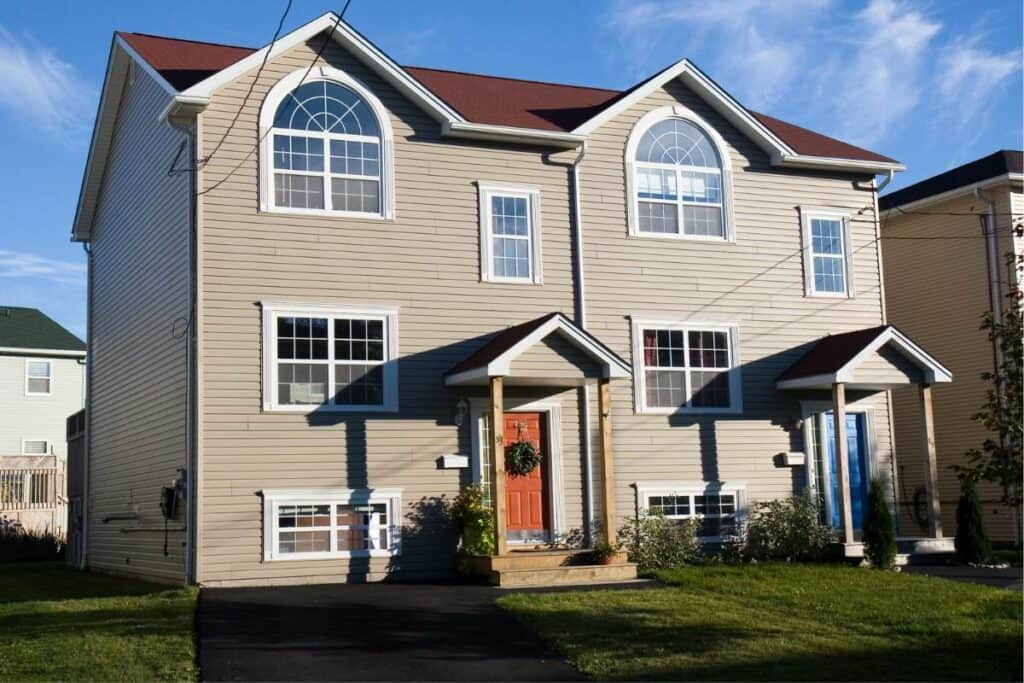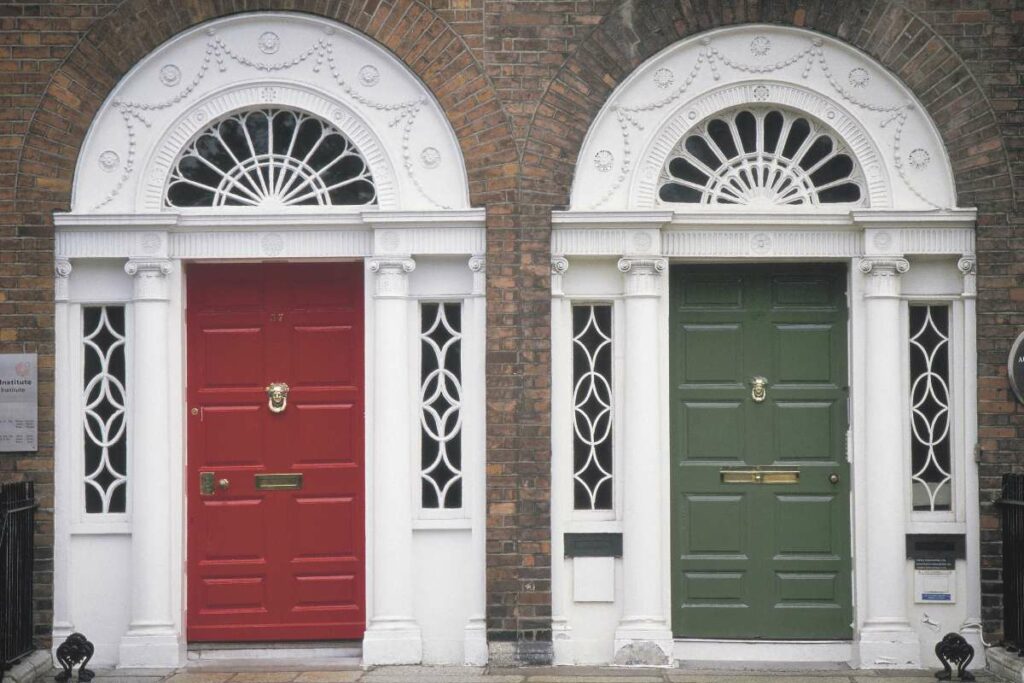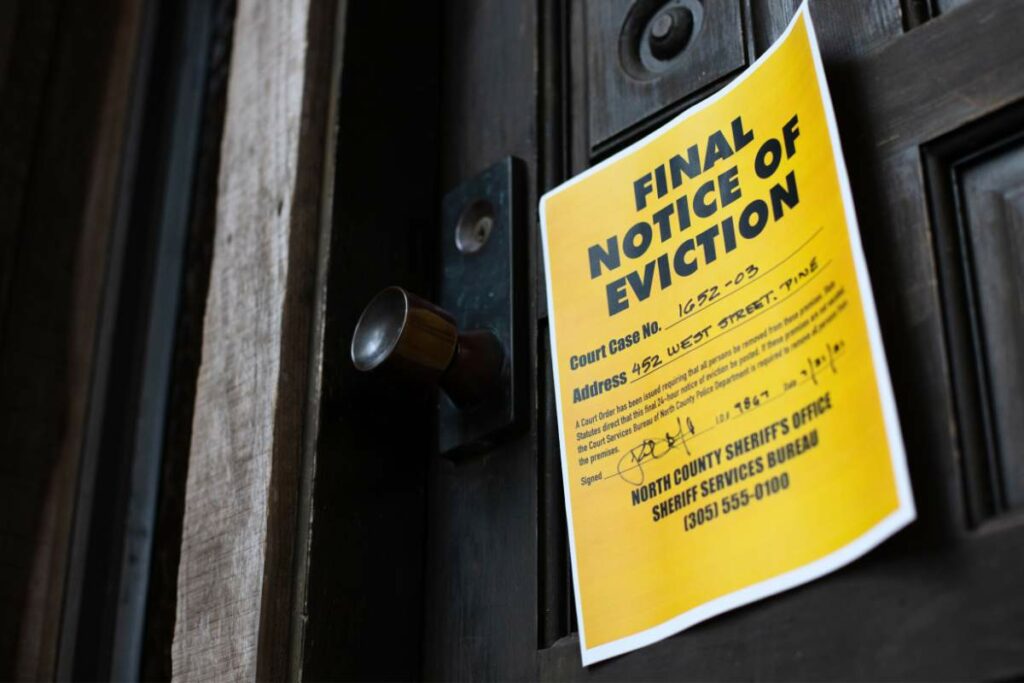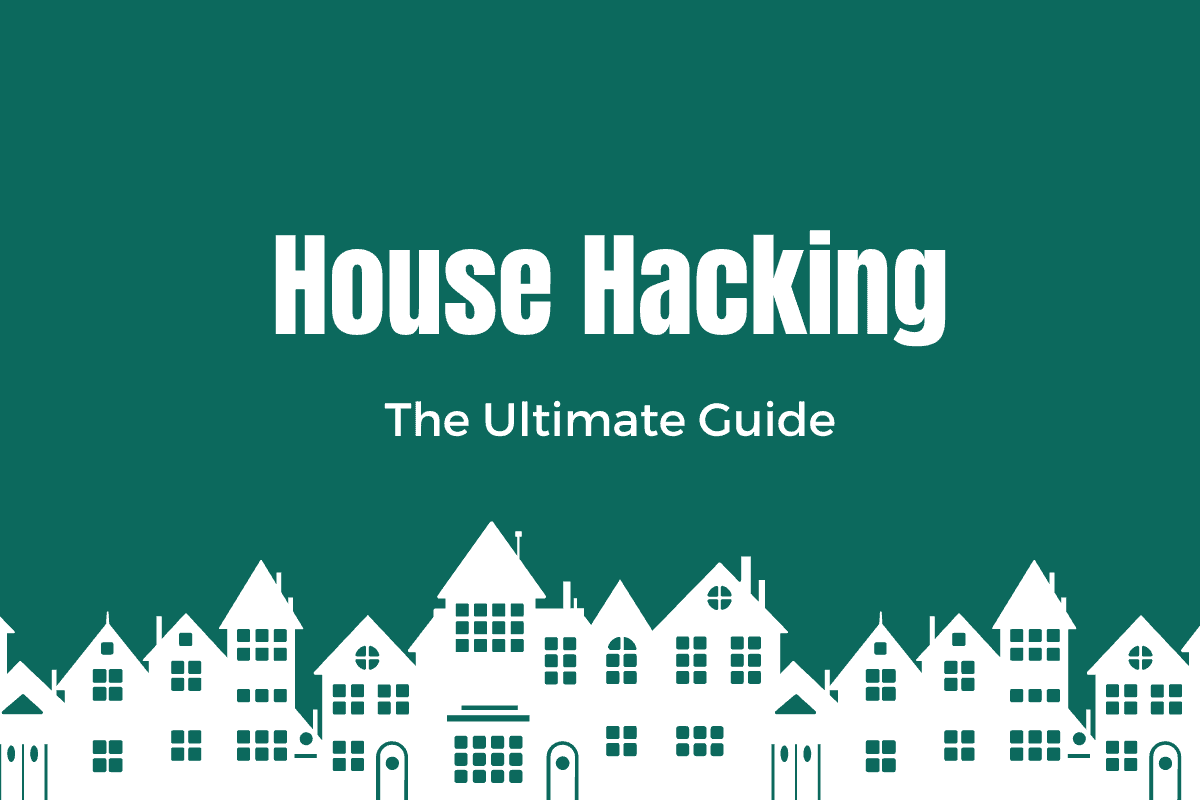House hacking is a popular real estate investing strategy, and for good reason.
A house hacking homeowner can dramatically reduce his or her housing costs, if not completely eliminate them.
Everything You Need to Know About House Hacking

What is House Hacking?
House hacking is when someone rents out extra space in his or her home while living in it.
It’s a simple real estate investing strategy.
And it’s particularly good for beginners.
By renting out the extra space, a homeowner can offset his or her housing costs.
In an ideal case, the entire mortgage, utilities, and any taxes are entirely covered by the rental income.
That homeowner gets to live without having to worry about covering housing costs.
House hackers typically buy a 1 to 4 unit building, live in one unit (or bedroom) and rent out the remaining units (or other rooms).
By living in the property, this often grants house hackers excellent financing options. Let’s go over those now.
Financing Options for House Hacking

One of the best things about house hacking is its access to amazing financing.
Since house hackers lives in the property, they generally have access to owner-occupied financing. These loans typically have the best loan terms out there.
Owner Occupied Loan Options
And “owner-occupied loan” is one that requires you to live in the property for some length of time.
Owner-occupied loans tend to have some of the best mortgage terms possible.
They can be either fixed-rate or variable rate.
Fixed-rate mortgages have an interest rate that remains the same for the life of the loan, so your monthly payments will never change.
With an adjustable-rate mortgage (ARM), the interest rate can fluctuate up or down over time, and your monthly payments will change accordingly.
Whatever the case, let’s review some of the common owner-occupied loan options used by house hackers.
| Loan Type | Min. Down Payment | Interest Rate | Mortgage Term | Mortgage Insurance | Prepayment Penalty |
|---|---|---|---|---|---|
| Conventional | 5% | Fixed/Adjustable | 15-30 years | PMI until 20% equity | Varies |
| FHA | 3.5% | Fixed/Adjustable | 15-30 years | Permanent MIP | None |
| VA | 0% | Fixed/Adjustable | 15-30 years | None | None |
| USDA | 0% | Fixed | 30 years | None | None |
1. Conventional Mortgages
Conventional mortgages are the most common type of mortgage used to purchase a home. They’re typically available with either a fixed or adjustable interest rate and have a repayment term of 15 to 30 years.
A conventional mortgage can be “conforming” or “non-conforming.”
Generally speaking, confirming loans are ones that follow very specific guidelines set by the federal government that allow lenders to sell the loan to a government entity (like Fannie Mae or Freddie Mac).
Non-confirming loans do not necessarily follow the same guidelines and thus might vary more widely in their structure and terms.
Most house hackers will be able to qualify for a conforming conventional loan. These will typically be fixed-rate, 30-year loans only requiring a 5% down payment.
However, if the down payment is below 20%, a buyer will typically have to pay private mortgage insurance (PMI), which is an extra payment on top of the regular mortgage payment.
The PMI amount can vary by lender, but usually equals only a small percentage of the existing mortgage payment.
And PMI for a conventional mortgage will drop off once a borrower reaches 20% equity based on the purchase price of the property, so it’s not permanent. Usually, a borrower can also ask for an appraisal to check to see if the property has appreciated to the point that he or she has reached that 20% threshold.
2. FHA Loans
FHA loans are government-insured loans that are available to both first-time homebuyers and existing homeowners.
They’re one of the most popular options for house hackers.
FHA loans offer a 3.5% down payment with a low, fixed interest rate over 30 years. This makes them a powerful tool for getting into a piece of real estate with very little down.
There’s even a special FHA loan through the FHA 203(k) program. FHA 203(k) loans allow buyers to finance the cost to rehab the property as well. Here’s an overview of FHA 203(k) loans and how to use them.
FHA loans typically have more relaxed credit requirements compared to other loan programs. So that’s another plus for someone who doesn’t have extensive positive credit history already.
However, with FHA loans, there is a extra monthly insurance payment that a borrower will have to make for the entire life of the loan. This is called “Mortgage Insurance Premium,” or “MIP” for short.
MIP can only be removed if the borrower pays off the loan or refinances to a non-FHA loan.
Because of this, many borrowers prefer to use a 5% down payment conventional loan rather than an FHA loan since PMI on a conventional mortgage is not permanent. And the difference in required down payment is often rather small.
Nevertheless, the FHA mortgage program remains a powerful way to get started with house-hacking.
3. VA Loans
VA loans are another great financing option for house hackers. These loans are offered through the Department of Veterans Affairs and are available to military veterans and their families.
VA loans offer a host of benefits, including:
- No down payment required
- Low, fixed interest rates
- Lenient credit requirements
- Funding for renovation and repairs
- No mortgage insurance premiums
- Limited closing costs
- Pre-payment penalties waived
Of course, this great financing option is only available to veterans, so not every house hacker has access to it. But, if you are a veteran, it’s a powerful tool.
4. USDA loans
USDA loans are available to some house hackers as well. These loans are offered through the U.S. Department of Agriculture and are available to rural homeowners.
To qualify for a USDA loan, you must:
- Meet income eligibility requirements
- Have a credit score of 640 or higher
- Purchase a property in a USDA-eligible area
- Have a debt-to-income ratio of 41% or less
USDA loans offer a number of benefits, including:
- No down payment required
- Low interest rates
- Lenient credit requirements
- Funding for renovation and repairs
- No mortgage insurance premiums
- Pre-payment penalties waived
Again, not every house hacker will qualify for a USDA loan. But, if you do, it’s a great financing option.
Other Loans
There are other loan programs out there, and they are always subject to change. However, the ones mentioned above are the most common.
Definitely talk with a loan officer to explore your options and figure out your next steps for getting approved.
But, if you don’t want to use (or can’t qualify for) an owner-occupied loan to purchase the property, you do have additional options. Let’s discuss those now.
Non-Owner Occupied Loans
Not every property will qualify for traditional, owner-occupied financing. That said, you can use non-owner-occupied loans to finance your property.
These loans have more flexible terms than owner-occupied loans, and they can be used to purchase properties in any condition. But they are often a lot more expensive.
1. Hard Money
A “hard money” loan is typically a short-term loan with far less stringent credit and income requirements. These loans are often very expensive, with high interest rates and fees but are dramatically easier to qualify for.
2. Private Money
Private money loans refer to those loans given by individuals to other individuals. That is, maybe you have a friend or family member willing to lend you the cash to purchase a property. Private money loan terms vary enormously.
3. Portfolio Loans
A portfolio loan is a type of non-conforming loan that allows investors to finance properties that don’t fit the traditional lending guidelines. These are loans a bank will give to investors that the bank keeps in its own lending portfolio, rather than selling the loan to a third party.
Terms can be quite flexible, though they’re typically more expensive than a typical, owner-occupied loan program.
Financing vs. Using Cash
While there are many great loan programs available to house hackers, a buyer can use cash as well. In some cases, this might make sense.
By using cash, you’ll avoid having to make loan payments on the property. This will improve your cash flow position significantly. And you’ll have a lot more room for error on the deal.
Of course, there are also downsides to using cash. For one, you’ll have a lot less liquidity if you need the money for something else down the road. Additionally, you’ll miss out on the potential tax benefits that come with owning a rental property.
It’s ultimately up to you whether you want to finance your property or use cash.
However, unless you have a huge pile of cash already, it will take dramatically more time to save up enough to buy a property in all cash compared to financing it with a low-down payment mortgage.
Building Credit for House Hacking

Credit is an important factor to consider when house hacking, as it can impact your ability to secure financing for the property and you mortgage terms.
Thankfully, there are plenty of actionable steps you can take to build your credit.
But first, let’s discuss how your credit score works.
How Your Credit Score Works
Your credit score is one of the most important numbers in your financial life.
It’s a three-digit number that represents how likely you are to repay debt, and it’s used by lenders to determine whether to give you a loan and what interest rate they’ll charge you.
There are 5 key factors that determine your credit score:
- Payment history: This is the most important factor in your credit score, accounting for 35% of your total score. It includes whether you’ve made your payments on time, and if you’ve ever missed a payment or declared bankruptcy.
- Amounts owed: This is the second most important factor, accounting for 30% of your score. It includes how much debt you have and what your credit utilization ratio is.
- Length of credit history: This is the third most important factor, accounting for 15% of your score. It includes how long you’ve had credit accounts and whether you have a mix of different types of accounts.
- New credit: This is the fourth most important factor, accounting for 10% of your score. It includes how many new credit accounts you have and how often you’ve applied for credit in the past 12 months.
- Credit mix: This is the fifth most important factor, accounting for 10% of your score. It includes whether you have a mix of different types of credit accounts, such as a mortgage, car loan, and credit card.
Why Your Credit Score is Important
A high credit score means you’re a low-risk borrower, which could lead to lenders approving your loan application and offering you a lower interest rate.
A low credit score could lead to higher interest rates and could mean you won’t be approved for a loan at all.
Your credit score could be the difference between a great deal and no deal at all.
Even if you don’t want to take out a ton of debt, it’s very nice to have a good credit score. You never know when it might be useful to take out a loan, and you’d always prefer to have the best terms. A high credit score unlocks those.
Building Your Credit For Real Estate
Building credit can be difficult, especially if you’re just starting out. But there are a few things you can do to make it easier:
- Get a credit card and use it responsibly: If you don’t have any credit history, one of the best things you can do is get a credit card and use it responsibly. That means making your payments on time, every time, and keeping your balance low.
- Check your credit report regularly: You should check your credit report at least once a year to make sure there are no mistakes. You can get a free copy of your credit report from each of the three major credit bureaus – Equifax, Experian, and TransUnion – once every 12 months.
- Consider a credit-builder loan: a credit-builder loan is a type of loan designed to help people build their credit. With a credit-builder loan, you borrow a small amount of money and agree to make regular payments over a set period of time.
- Become an authorized user on someone else’s credit card: If you know someone with good credit, you can ask them to add you as an authorized user on their credit card. This means you’ll be able to use their credit card, but you won’t be responsible for the bill.
- Pay your bills on time: One of the best things you can do to build your credit is to pay your bills on time, every time. That includes everything from your rent to your car payment to your credit card bill.
- Keep your balances low: Another important thing to remember is to keep your balances low. That means you shouldn’t be using more than 30% of your credit limit on any one credit card.
- Use a mix of different types of credit: It’s also important to use a mix of different types of credit, such as a mortgage, car loan, and credit card. This shows lenders that you can handle different types of debt responsibly.
- Avoid opening too many new accounts: Opening too many new credit accounts in a short period of time can be a red flag to lenders. So, if you’re trying to build your credit, it’s important to avoid opening too many new accounts.
- Don’t close old credit accounts: Closing an old credit account can actually hurt your credit score, so it’s best to avoid doing it if you can.
- Consider a secured credit card: a secured credit card is a type of credit card that requires you to put down a security deposit, which is usually equal to your credit limit. This deposit is used to secure the credit line, which means you’re less likely to default on your payments.
Building credit can be difficult, but it’s important if you want to get the best terms on a mortgage.
While you’re building your credit, you can start building your down payment and initial cash reserves.
Saving Up For the Deal

Even with the many low (and no!) down payment options out there, you’ll still need to save up some cash for a house hacking deal.
Between the down payment itself, closing costs, a rehab budget, and initial cash reserves, you’ll need to save up some significant cash.
Though it will likely be a lot less than if you had to use a traditional investment loan with larger down payment requirements!
Saving for a Down Payment
The down payment is the biggest hurdle for most home buyers, but it doesn’t have to be.
Here are a few tips for saving up for a down payment:
- Start early: The sooner you start saving, the easier it will be. If you’re just starting out, try to save at least 10% of your income.
- Create a budget: A budget can help you see where your money is going and how much you can afford to save.
- Save automatically: Set up automatic transfers from your checking account to your savings account so you’re less likely to spend the money.
- Cut back on expenses: You may need to make some sacrifices in order to reach your goal. That could mean giving up your cable TV subscription or eating out less often.
- Get creative: There are a number of ways to come up with extra money, such as selling unwanted items or taking on a side hustle.
Down Payment Assistance Programs
If you’re having trouble saving for a down payment, there are a number of down payment assistance programs available. These programs provide either cash grants or low-interest loans to help with the down payment and closing costs.
Eligibility for these programs typically depends on factors like your income, credit score, and the type of home you’re buying.
Initial Cash Reserves
Once you’ve saved up for a down payment, you’ll also need to have enough cash reserves to cover the closing costs and any other unexpected expenses.
Closing costs can range from 2% to 5% of the purchase price of the home, so it’s important to have an estimate before you start shopping.
You’ll also want to have some cash set aside for things like furniture and appliances, as well as any repairs or renovations that need to be done.
Finding a Property to House Hack

Finding the right property to house hack is often the most time intensive portion of the entire process.
By understanding how to identify properties with strong potential for house hacking, you’ll be well-equipped to embark on this exciting real estate investment strategy.
First, it starts with narrowing your search.
Defining Your Strategy
Before embarking on your house hacking journey, it’s crucial to define a strategy that aligns with your goals and preferences. This will make it a lot easier to identify good deals when they come up. And it will save you a lot of time from looking at properties that wouldn’t work.
Consider the following factors when defining your house hacking strategy:
- Occupancy Type: Determine whether you want to live in one unit and rent out the others or explore alternative arrangements like renting by the bedroom or utilizing short-term rentals. Each option comes with its own benefits and drawbacks. Think about your cash flow goals, management capabilities, and lifestyle preferences.
- Multifamily vs. Single Family: Are you looking for a mutli-unit building? Or will a single family condo where you rent out one of the extra bedrooms work? Consider the local inventory for different property types and whether you’d be willing to share a single unit with someone else (or if you’d only house hack if you can have entirely separate units from any tenants).
- Financial Considerations: Evaluate your financial situation and goals. Consider your budget, financing options, and required income. Assess your ability to cover mortgage payments, operating expenses, and potential vacancy periods. A bigger property will generally have bigger income potential but also bigger expenses.
- Property Management: Decide on the level of involvement you want in managing the property. Determine whether you will self-manage everything or hire a property manager. Consider your time availability, skills, and desired level of control. Finding the right balance in property management will contribute to a smooth and efficient house hacking experience.
Once you’ve defined your general strategy, you can start looking for properties that fit your criteria.
But once you’ve found a potential property, how do you figure out whether it would work?
How to Run the Numbers on a House Hack Deal
Running the numbers might be the single most important step in the buying process.
If you don’t know if the deal will pencil out, how could you possibly know whether it’s a “good” deal?
Thankfully, running the numbers doesn’t have to be complicated.
For a basic financial analysis of a property, considering the following:
- Calculate Rental Income: Estimate the potential rental income for each unit based on market rates and demand. Research comparable rental properties in the area to gauge rental prices. Consider factors such as location, finishes, property size, amenities, and local rental trends.
- Subtract Operating Expenses: Identify the various expenses associated with the property, including mortgage payments, property taxes, insurance, maintenance, repairs, utilities, and any property management fees. Be diligent in accounting for all costs to get an accurate picture of your cash flow.
- Subtract Your Mortgage Payment: Explore different financing options available for house hacking, such as conventional loans, FHA loans, or VA loans. Research the down payment requirements, interest rates, and loan terms for each option. Assess how these factors will impact your overall financial situation.
- Calculate Cash Flow: After subtracting your operating expenses and mortgage payment from your estimated rental income, you’ll have your cash flow. Positive cash flow indicates that your rental income exceeds your expenses, while negative cash flow may require further evaluation.
- Consider Principal Paydown: If you’re using a loan, you’ll usually have significant principal paydown each month. Consider that in your calculations as well.
- Evaluate Return on Investment (ROI): Your return on investment is calculated by dividing the total amount of money you’ve gained over the total amount of money you’ve invested into the deal. Consider how much money you’d have to put into the deal to get your cash flow number. Are you having to invest $100,000 into a deal just to make $25 per month in cash flow? How much principal paydown would you be doing from the start? Is your potential return attractive?
It’s a good idea to run the numbers on the property as though you would be renting out all of the units (as a full rental) since you never know when you’ll want to leave the property.
If it would work as a “full” rental and not just a house hack, that gives you that much more flexibility for the long run.
So run the numbers that way first.
For a house hack, calculating a true return on investment is tricky.
The property might not cash flow while you’re living in it, but your net housing costs will probably be a lot lower than if you were not house hacking.
Those savings are a “return” of sorts.
Either way, make sure you know what you would approximately be earning (or paying) each month to own the potential house hack deal you’re looking at.
Think of every potential expense: utilities, taxes, landscaping, and any management fees, among many other items.
Take a look at what the total payments would be even if the whole property was vacant. You might have to float those payments for some time in the future. This can help you to figure out a comfortable amount of reserves to start with.
By running the numbers on a house hack deal, you can make informed decisions based on the financial feasibility and potential return on investment. Don’t go in blind.
How to Buy a Property to House Hack (Step By Step)

Buying a property, especially if you have never bought one before, can be quite intimidating.
After all, this is typically one of the largest, if not the largest, purchase of a person’s life.
A lot of things happen between making an offer on a property and actually getting the keys. Let’s break down the process into easier-to-follow steps.
Step 1: Identify Your Target
Before you start looking, you have to have some idea of what you’re looking for.
Are you wanting to get started with a small multi-family building? Or a single-family home? Are condos off of the table?
Similarly, what neighborhoods are you considering? Are there specific blocks you’d be especially interested in?
To be efficient in your search, you want to know what you’re searching for in the first place.
But, once you figure out you target property characteristics, you can start building your team.
Step 2: Build Your Team
Real estate is a team effort. You won’t be doing it alone, whether you’ve done 100 deals or 0.
Your team will look something like the following:
- Real Estate Agent – your agent helps you to find the property in the first place. Agents can send listings, walk properties with you, and help put your offers together.
- Lender – unless you have a huge pile of cash, chances are you’ll need a lender. They’ll let you know what you need to get approved for your loan. They can also get you a pre-approval letter so you can start making more competitive offers on properties.
- Inspector – this person is a highly trained set of eyes who will look for defects in the property. Whether it be spotting old water damage to calling out defunct outlets, inspectors are a vital first line of defense before moving forward with a property purchase.
- Insurance Agent – to insure your property against all sorts of things, your insurance agent will help you find a homeowners policy prior to closing.
- Attorney – many states require a person hire an attorney to close on a property. Many others do not. Regardless, an attorney is a professional set of eyes who can help you navigate difficult negotiations, call out concerning terms in a contract or document, and help move closing along while the title company works through any issues. Even if you do not need an attorney in your state, it’s recommended that you pay the few hundred bucks to get one.
- Title Company – depending on your state, the seller often choses a preferred title company. Title companies review the various documents and other items affecting the property. They want to make sure title is clean before they issue a title policy, which insures you against someone else claiming that they have a claim over the property after you close on it.
- Contractors – these are the people who will help you do any rehab on the property or otherwise maintain it. From roofers, to plumbers, to electricians, and more, contractors can also be a helpful set of eyes when you are inspecting the property prior to closing.
- Property Manager – property managers manage the day-to-day operations on a property after you close. As a house hacker, you probably won’t need to hire a property manager anytime soon, but, if you do, definitely talk with one before you close on the property. They can offer an especially valuable opinion on the property. If they wouldn’t manage it, chances are you shouldn’t either!
To assemble your team, assuming you don’t know anyone in the real estate space already, start by reaching out to some agents in your area. Let them know what you’re looking for.
Once you find an agent that you like, try asking for introductions to the other prospective members of your team. Agents often have an attorney or lender that they prefer to work with. That can be a great start towards putting your team together.
Alternatively, you can ask your lender (or any other member on your team) for recommendations. It doesn’t have to be an agent making the connections.
Once you are connected with a few members of your team, finding the others should become increasingly easy!
With your team assembled, or at least mostly assembled, it’s time to start looking at properties.
Step 3: View Properties
Now for the fun part: actually looking at deals!
This is likely where you’ll spend most of your time.
That’s because great deals are great because they are relatively rare. It often takes a while for one to come up.
You may have to look at dozens of properties before you find even just a couple that you like and that would make for potentially decent deals.
But, for each property you look at, you’ll be getting a firmer grasp on that sub-market and will be able to identify a great deal more easily in the future.
Make note of properties that you like but may be overpriced currently. If the deal doesn’t sell anytime soon, chances are the seller will lower the price.
While you’re looking at properties, you can work on getting pre-approved by your lender.
Step 4: Get Pre-Approved for Financing
A pre-approval letter is a document that states that your lender has conditionally approved you for a particular loan amount. The letter is often included in an offer for a property to help prove the buyer’s credit worthiness and ability to close.
To get a pre-approval letter, ask your lender what they need.
Typically, you’ll have to provide them with your personal information, including your social security number, and your estimated monthly income. They’ll likely do a hard pull on your credit report to check your credit score and existing minimum debt payments.
So long as this preliminary information checks out, you should be able to get your pre-approval letter.
Often times, you can complete the pre-approval process entirely online without having to speak with anyone.
While there are still plenty of other steps to get approved for financing prior to closing, the pre-approval letter is a significant milestone on the way towards buying a property.
Step 5: Make Offers
Your agent will help you submit offers to sellers.
Because you have you pre-approval letter, you’ll be more reputable in a seller’s eyes.
And when you’re making offers, realize that denial is part of the process. If you’re not being denied, you’re probably being overly aggressive in your offers.
Focus on learning from the experience and using it to improve your strategy for the next offer. And don’t be discouraged when someone else decides to overpay for the property.
That said, be prepared to negotiate. It’s rare that a seller will accept the very first offer you give them, even when it’s a good one.
For my first house hack deal many years ago, I made a good dozen offers before getting one accepted (and ended up backing out of that one anyways). This can take time.
Again, don’t get discouraged! It’s better to land a great deal in a few months rather than a bad deal in one week.
Step 6: Get a Property Under Contract
Eventually, you’ll get an offer accepted. You’ll then be “under contract” on the deal.
The contract will say whether you get an inspection and/or due diligence period (you should definitely get one, especially if this is your first deal!). It will also outline all of the other deadlines for the deal.
You only get what you bargain for.
Now for the home stretch!
Step 7: Due Diligence
The due diligence period is your chance to take one last look (or many looks) before you close on the property.
Some common aspects of the due diligence process include conducting a home inspection to identify any potential issues or repairs that may be needed, reviewing the property’s title to ensure that there are no encumbrances or liens, and reviewing any disclosures provided by the seller to identify any known issues with the property.
This is when you would bring in your inspector to take a look at the property. They’ll be able to identify major (and minor) issues with the property.
A good inspector is one of the greatest investments during the deal.
The few hundred bucks you pay the inspector will potentially save you many thousands if you discover issues that you might have not been able to identify easily, especially as a new investor.
Sometimes, it will make sense to bring in a specialist, like a contractor who works on roofs or electrical. They can give you more specific advice on what you should do to fix issues on those items within their wheelhouse.
To that, with your inspection report and any contractor quotes in hand, you can ask the seller for a closing credit to cover some (or all) of those issues.
A closing credit is applied to the costs when you go to close the property. A closing credit can be used to offset some or all of your closing costs, which can be a helpful way to reduce the overall cost of the transaction and offset the costs of some of the issues you discovered during due diligence.
The seller may not always accept your request for a credit, but if you discovered something new during the due diligence process, this can be a great chance to get a credit. How much you can get will largely depend on how competitive the market is and whether the seller is confident he or she can get more from a different buyer.
| Due Diligence Step | Details |
|---|---|
| Home Inspection | Identify property issues and potential problem areas |
| Title Review | Ensure no encumbrances or liens on the property |
| Contractor Consultation | Seek expert advice for specific repair areas if necessary |
| Requesting Closing Credit | Negotiate credit to offset repair costs if appropriate |
| Assessing Deal Viability | Consider backing out if significant issues or title problems arise |
There are a few situations where it might make sense to back out of a deal during the due diligence process.
For example, if the home inspection uncovers significant issues that would be costly and complicated to repair, you may decide that the property is not a good fit for you.
Similarly, if you uncover a problem with the title, such as an outstanding lien or encumbrance, you may decide that the risk is too great and choose to back out of the deal.
Ultimately, the decision to back out of a deal during the due diligence process should be based on your personal risk tolerance and the specific circumstances of the property.
Remember, a bad deal today is a lot more expensive than a great deal a few months from now. Don’t force it.
Step 8: Get Officially Approved for Financing
While you’re conducting your due diligence on the property, your lender will typically get going on approving your loan.
During this step, the lender will get the property appraised. This is where the lender sends a licensed appraiser to value the property.
An appraiser assesses the property based on factors like its condition, location, comparable sales, and market trends. If the appraised value falls short of the purchase price, it can create challenges in the financing process.
To protect yourself, it is common to include a financing contingency in the purchase contract.
A financing contingency specifies that the purchase is contingent upon obtaining satisfactory financing. If you encounter issues with financing approval, the financing contingency generally allows you to terminate the contract without penalty.
If the appraisal comes in lower than the purchase price, you’ll often have these options:
- Renegotiate the price with the seller based on the appraised value, bringing it closer to the loan amount
- Provide additional funds to cover the difference between the appraised value and the purchase price
- Find someone else who can finance the deal in time
If these options are not feasible, you may have to walk away from the deal.
Including a financing contingency in the contract safeguards your interests by giving you an exit strategy if financing issues arise.
But, if all goes well, you’ll get a final approval from the lender and a “clear to close” confirmation.
Step 9: Final Review
Before you close on the property, you’ll want to double check everything one last time (your attorney should help you with a lot of this!):
- Final Walkthrough: Schedule a final walkthrough of the property shortly before closing to ensure there haven’t been any new, unplanned changes or damage.
- Documentation Review: Carefully review all of the final closing documents, including the loan documents and disclosures. Verify that the terms and conditions align with your expectations and address any concerns with your attorney.
- Title Examination: Ensure that the title search has been completed, and there are no unexpected liens, encumbrances, or ownership disputes that could jeopardize your ownership rights. Review the title insurance commitment and address any issues with the title company (your attorney should handle this).
- Loan Confirmation: Verify that your financing is good to go. Confirm the loan terms, interest rate, and any applicable fees to ensure they match what was previously agreed upon.
- Insurance Coverage: Confirm your homeowner’s insurance and that the coverage is in place before closing. Review the policy to understand the extent of coverage. You’ll have to provide proof of insurance to your lender, assuming you haven’t already.
- Closing Costs Review: Carefully examine the closing disclosure, which outlines the final costs associated with the transaction. Ensure that the fees and charges are accurate and align with the initial estimate. Also make sure any credits that you negotiated are included on there!
If everything checks out, you can wire money over to the title company as they will direct you to. Then it’s time to close!
Step 10: Closing
Closing is when you and the seller officially switch ownership. But there’s still work to be done to make sure of that.
You may or may not have to be physically present for closing. Many closings can take place virtually.
Generally, you’ll have to sign your closing documents in the presence of a notary, which could take place remotely or at the title company. Either way, this would be coordinated in advance of the official closing day.
Just be sure someone is able to grab the keys after closing!
But, once the title company confirms that all parties have completed all required documents and everything is funded, they’ll announce that the transaction is closed.
Ownership will officially transfer over to you.
Step 11: Changing Ownership
Now take a moment to congratulate yourself on landing your deal!
You now officially own the property. Your house hacking journey can now get going in earnest.
After you close on the property, definitely change the locks sooner rather than later.
And prepare for the next phase!
Step 12: Rehab
If you bought a property that needed work, it’s time to do that work.
Ideally, you would have started scheduling the post-closing work while you were under contract on the deal, but that’s not always feasible.
Don’t be surprised if things end up costing more than you initially expected. As a project gets under way, you’ll likely come across at least a few surprises.
Step 13: Manage Your House Hack!
Of course, you’re not done yet. You’ve only just begun!
It’s time to start managing the property, maintaining it, and bringing in tenants. More on that below.
Managing a House Hack

Once you actually buy the property, now it’s time to manage it!
House hacking, like all real estate investing, requires some sort of management system, whether it’s through you or someone else.
Finding and Managing Tenants
Step 1: Finding and Screening Tenants
To start, you’ll need to figure out which parts of your property you will be renting out and how much rent you will be charging. You can check similar properties for a good idea of what the going rental rate is (which you should already be familiar with from your initial research before buying the property!).
Once you’ve determined your rent, you’ll need to create a professional rental listing that includes photos, a detailed description of the space, and any amenities that will be available to your future tenant.
Make sure to highlight any unique features of the property that might make it more attractive.
You can use rental listing and roommate sites (like apartments.com) to post your listing.
While we’re on the topic, here’s a full guide for finding roommates for your house hack.
When you start receiving inquiries, it’s important to screen potential tenants thoroughly. You should ask for references, run background and credit checks, and verify employment and income. This will help you ensure you are renting to reliable tenants who will pay their rent on time and take care of the property.
There are lots of options out there for tenant screening. I’ve used TransUnion Smart Move a number of times in the past for background and credit checks. You can have the prospective tenant pay for the application fee directly if you’d like.
Whatever you do for tenant screenings, don’t just take a prospective tenant’s word at face value. A simple background check can be what protects you from fraud and other terrible situations.
Step 2: Setting the Rules
It’s important to consider how you will share common spaces with them, such as the kitchen or living room. Make sure you find tenants who are compatible with your lifestyle and have similar expectations about how to use shared spaces.
If the units are totally separated and there aren’t many common areas, you’ll naturally have an easier time.
First, particularly if you’re renting out bedrooms with shared common areas, you’ll need to make sure that your renters understand the rules and regulations of the house.
This includes things like quiet hours, visitors, and any other house rules you may have.
Step 3: Communication
You’ll need to be available for your tenants if they have any questions or issues.
Ultimately, effective property management comes down to setting clear expectations and treating your tenants fairly.
That starts with clear and consistent communication.
By fostering a positive relationship with your tenants, you can ensure they are happy living in the property, and they will be more likely to renew their lease when it’s time to do so.
Should You Use a Property Manager When House Hacking?
If you live in the property, then you’ll most likely manage it yourself. This is often the best option as it’s free! And, if you live there anyways, then managing it shouldn’t be that big of a deal.
Of course, this isn’t always the case.
When it comes to house hacking, there is no one-size-fits-all answer to whether or not you should use a property manager. Ultimately, the decision comes down to your personal circumstances and what will work best for you and your investment.
There are several things to consider when making the decision of whether or not to use a property manager, such as:
- How much time you have to dedicate to being a landlord
- The number of units in your property
- Your comfort level with handling tenant issues and maintenance requests
- The amount of rent you are collecting relative to the cost of a property manager
If you have the time and energy to be an involved landlord, then you may not need to hire a property manager. However, if you have a larger property or you are not comfortable dealing with tenants directly, then a property manager may be a good option for you.
Ultimately, the decision of whether or not to use a property manager comes down to what will work best for you and your investment. Consider all of the factors involved before making a decision.
The “Training Wheels” Approach to Real Estate Investing
By house hacking, you’ll learn the fundamentals of real estate investing while mitigating your risk.
By living in the property, you’ll get first-hand experience with being a landlord. You’ll learn how to deal with difficult tenants and how to manage repairs and maintenance.
And, in getting your property in the first place, you’ll learn about different financing options, real estate market analysis, and negotiating lease terms.
All are critical skills for being a successful real estate investor.
What Happens Next?

Congratulations on successfully purchasing your house hack property and getting it up and running!
You’re bringing in rent to offset your housing costs, you’re paying down the mortgage each month, and you’re learning more about real estate each day.
But what’s next? Naturally, you have some options.
Holding for the Long Term
After purchasing your house hack property, one option is to hold onto it for the long term.
You continue to rent out the extra space.
You continue to live with highly subsidized housing costs.
You can decide to leave the property.
Or not.
But, if you do leave the property after some time, you can then start renting out the entire building, not just the extra space. Just make sure you follow any restrictions against renting out the whole property as outlined in your mortgage.
If you do move away and rent everything out, you’ve just used house hacking as a way to get yourself a long term rental property with extremely favorable financing terms.
And you’ll be all the more educated after having done the deal.
Whatever the case, as you build more equity, you’ll gain more and more options for your financial future.
Investing Your Savings
Effective house hacking allows you to save money by offsetting your living expenses with rental income.
That means you’ll have more money to spend and invest elsewhere.
Consider investing these savings wisely to further grow your wealth. Maybe that’s into more real estate. Maybe that’s into stocks. Maybe you just want to build your cash reserves.
Or maybe it’s simply another house hack…
Buying Another House Hack
If you enjoyed the house hacking experience and want to expand your real estate portfolio, consider purchasing another house hack.
You can use the savings from your house hack to save up for another down payment. With low down payment mortgage options, you can get another down payment saved up relatively quickly.
And since you’ve already done one house hack, you should be even better equipped to handle a second one.
How Many House Hacks Can You Have?
Do keep in mind that you might run into some limitations when trying to buy more house hacks.
For one, be sure that you respect any restrictions in your mortgage. Lying to your lender that you will live in the property for at least a year and then immediately turning it into a full rental is not a good idea.
That said, you can do additional house hacks, typically 1 per year.
If you’re using conventional financing, while you can technically qualify for up to 10 conventional mortgages in your name, underwriting guidelines typically become very strict after the first four loans.
For a more in depth article on these restrictions, click here.
Of course, you have to consider your ability to manage owning multiple properties, as that is an administrative challenge in itself. But it’s a lucrative challenge if you can build good systems over the long-run!
Is There a Limit to How Many Mortgages I Can Take Out?
Technically, there’s no limit to the number of mortgages you can take out. But you’ll start to run into new challenges the more you take out, especially if they’re all in your own name.
Lenders will take a close look at your debt-to-income ratio and may not be willing to lend to you if it’s too high. Thankfully, you’ll be able to factor in rental income from units you’re no longer living in, so that should mitigate this issue.
And there’s the general limit of 10 conventional mortgages in your name, granted that doesn’t mean you can’t get other types of mortgages.
It’s worth discussing with a loan officer if you’re considering adding on more properties, and more mortgages, to your portfolio. They’ll have the best grasp on what you can or can’t do when it comes to lending limits and restrictions for different types of loans.
What Are the Risks of House Hacking?

While house hacking has the potential to be an incredibly profitable strategy, there are also some risks to be aware of.
The most obvious risk is that you may end up with difficult tenants who don’t pay rent on time or damage the property.
This is why it’s so important to screen your tenants carefully and set clear expectations from the beginning.
Another risk is that you may not be able to find renters for all of the units in your property. This is why it’s important to do your research and make sure there is demand for rentals in the area you’re looking to invest in.
And, if you are using debt, you need to keep up with payments to avoid damaging your credit and preventing foreclosure.
Finally, there is always the risk that the real estate market could crash and your equity would be wiped out.
This is why it’s so important to have a long-term plan and to always maintain adequate cash reserves. You need to be prepared to weather storms.
By being aware of the risks involved, you can take steps to mitigate them and make sure your house hacking experience is a positive one.
Conclusion – Getting Started with House Hacking
House hacking is an excellent way to get started in real estate investing.
By living in the property, you can mitigate your risk and learn the ropes of being a landlord. And, with the money you save on rent, you can start accelerating your investments.
Whether you’re a first-time investor or an experienced one, house hacking remains a viable and powerful strategy.
Ultimately, house hacking presents an opportunity to maximize your financial potential, create a strong foundation for future investments, and achieve your long-term wealth-building goals.
But, as always, tread carefully!
FAQs
Is house hacking only for single-family homes?
No, house hacking can be applied to various property types, including duplexes, triplexes, fourplexes, or even larger multi-unit buildings.
Can I use house hacking to buy my first home?
Absolutely! House hacking can be a great way to enter the real estate market, as the rental income can help you qualify for a larger loan or reduce your housing expenses.
Do I need to be an experienced real estate investor to house hack?
Not necessarily. House hacking can be a stepping stone towards becoming a real estate investor, but it’s also a viable strategy for homeowners looking to lower their housing costs.
What are the benefits of house hacking?
House hacking offers several benefits, such as generating rental income, building equity through property ownership, and potentially living for free or at a reduced cost.
Are there any downsides to house hacking?
While house hacking can be financially rewarding, it requires sharing living space with tenants and taking on the responsibilities of being a landlord. And, especially if you use debt, it can be financially risky. Properties require continuous maintenance and attention, and that can get expensive quickly.
Can I use house hacking as a long-term wealth-building strategy?
Absolutely! House hacking can provide a solid foundation for building wealth by allowing you to accumulate properties, generate rental income, and potentially achieve financial independence over time.
This website, and any communication stemming from it, should not be taken as financial or legal advice for your specific situation. Consult directly with a licensed financial professional should you need investment advice and consult directly with a licensed attorney directly should you need legal advice. Assume all links are affiliate links. I am an Amazon affiliate.


